Post Graduate Research Proposal: AI's Impact on Retail Supply Chains
VerifiedAdded on 2022/12/05
|6
|2483
|119
Project
AI Summary
This research proposal investigates the impact of artificial intelligence (AI) on value creation within retail supply chains. The study aims to explore technologies for improving supply chain performance, develop conceptual frameworks for future scenarios, and analyze AI's contribution to value creation. The proposal includes a literature review, research methodology utilizing both primary and secondary data collection techniques, and a discussion of ethical considerations. The methodology involves a mixed-methods approach, including grounded theory, and data analysis techniques. The research addresses ethical issues such as consent, anonymity, confidentiality, commercial sensitivity, and data protection, ensuring responsible data handling and adherence to relevant regulations. The study seeks to provide insights into the dynamic external environment and the transformations in overall functioning within the retail sector, offering recommendations based on the analysis of qualitative and quantitative data.
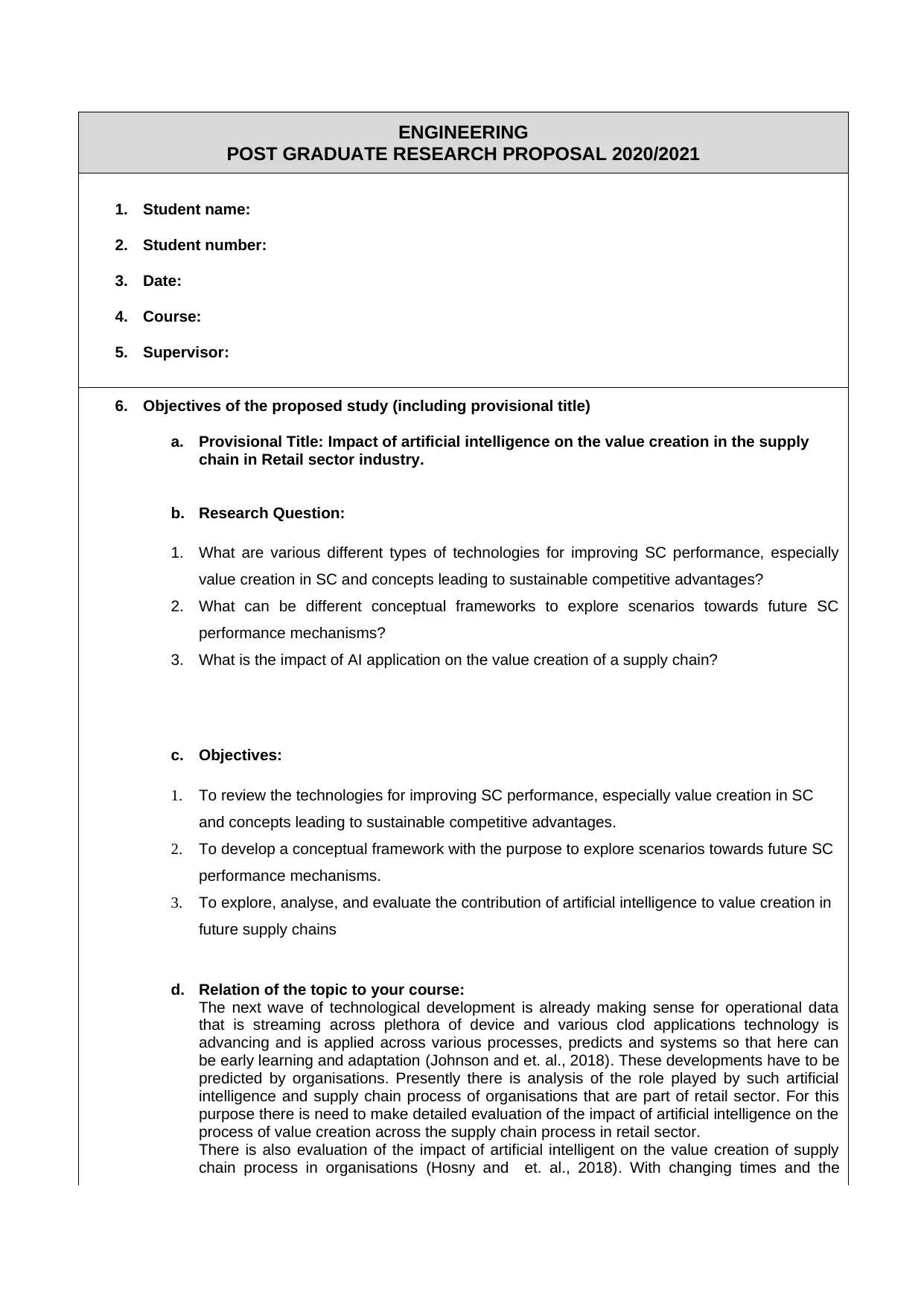
ENGINEERING
POST GRADUATE RESEARCH PROPOSAL 2020/2021
1. Student name:
2. Student number:
3. Date:
4. Course:
5. Supervisor:
6. Objectives of the proposed study (including provisional title)
a. Provisional Title: Impact of artificial intelligence on the value creation in the supply
chain in Retail sector industry.
b. Research Question:
1. What are various different types of technologies for improving SC performance, especially
value creation in SC and concepts leading to sustainable competitive advantages?
2. What can be different conceptual frameworks to explore scenarios towards future SC
performance mechanisms?
3. What is the impact of AI application on the value creation of a supply chain?
c. Objectives:
1. To review the technologies for improving SC performance, especially value creation in SC
and concepts leading to sustainable competitive advantages.
2. To develop a conceptual framework with the purpose to explore scenarios towards future SC
performance mechanisms.
3. To explore, analyse, and evaluate the contribution of artificial intelligence to value creation in
future supply chains
d. Relation of the topic to your course:
The next wave of technological development is already making sense for operational data
that is streaming across plethora of device and various clod applications technology is
advancing and is applied across various processes, predicts and systems so that here can
be early learning and adaptation (Johnson and et. al., 2018). These developments have to be
predicted by organisations. Presently there is analysis of the role played by such artificial
intelligence and supply chain process of organisations that are part of retail sector. For this
purpose there is need to make detailed evaluation of the impact of artificial intelligence on the
process of value creation across the supply chain process in retail sector.
There is also evaluation of the impact of artificial intelligent on the value creation of supply
chain process in organisations (Hosny and et. al., 2018). With changing times and the
POST GRADUATE RESEARCH PROPOSAL 2020/2021
1. Student name:
2. Student number:
3. Date:
4. Course:
5. Supervisor:
6. Objectives of the proposed study (including provisional title)
a. Provisional Title: Impact of artificial intelligence on the value creation in the supply
chain in Retail sector industry.
b. Research Question:
1. What are various different types of technologies for improving SC performance, especially
value creation in SC and concepts leading to sustainable competitive advantages?
2. What can be different conceptual frameworks to explore scenarios towards future SC
performance mechanisms?
3. What is the impact of AI application on the value creation of a supply chain?
c. Objectives:
1. To review the technologies for improving SC performance, especially value creation in SC
and concepts leading to sustainable competitive advantages.
2. To develop a conceptual framework with the purpose to explore scenarios towards future SC
performance mechanisms.
3. To explore, analyse, and evaluate the contribution of artificial intelligence to value creation in
future supply chains
d. Relation of the topic to your course:
The next wave of technological development is already making sense for operational data
that is streaming across plethora of device and various clod applications technology is
advancing and is applied across various processes, predicts and systems so that here can
be early learning and adaptation (Johnson and et. al., 2018). These developments have to be
predicted by organisations. Presently there is analysis of the role played by such artificial
intelligence and supply chain process of organisations that are part of retail sector. For this
purpose there is need to make detailed evaluation of the impact of artificial intelligence on the
process of value creation across the supply chain process in retail sector.
There is also evaluation of the impact of artificial intelligent on the value creation of supply
chain process in organisations (Hosny and et. al., 2018). With changing times and the
Paraphrase This Document
Need a fresh take? Get an instant paraphrase of this document with our AI Paraphraser
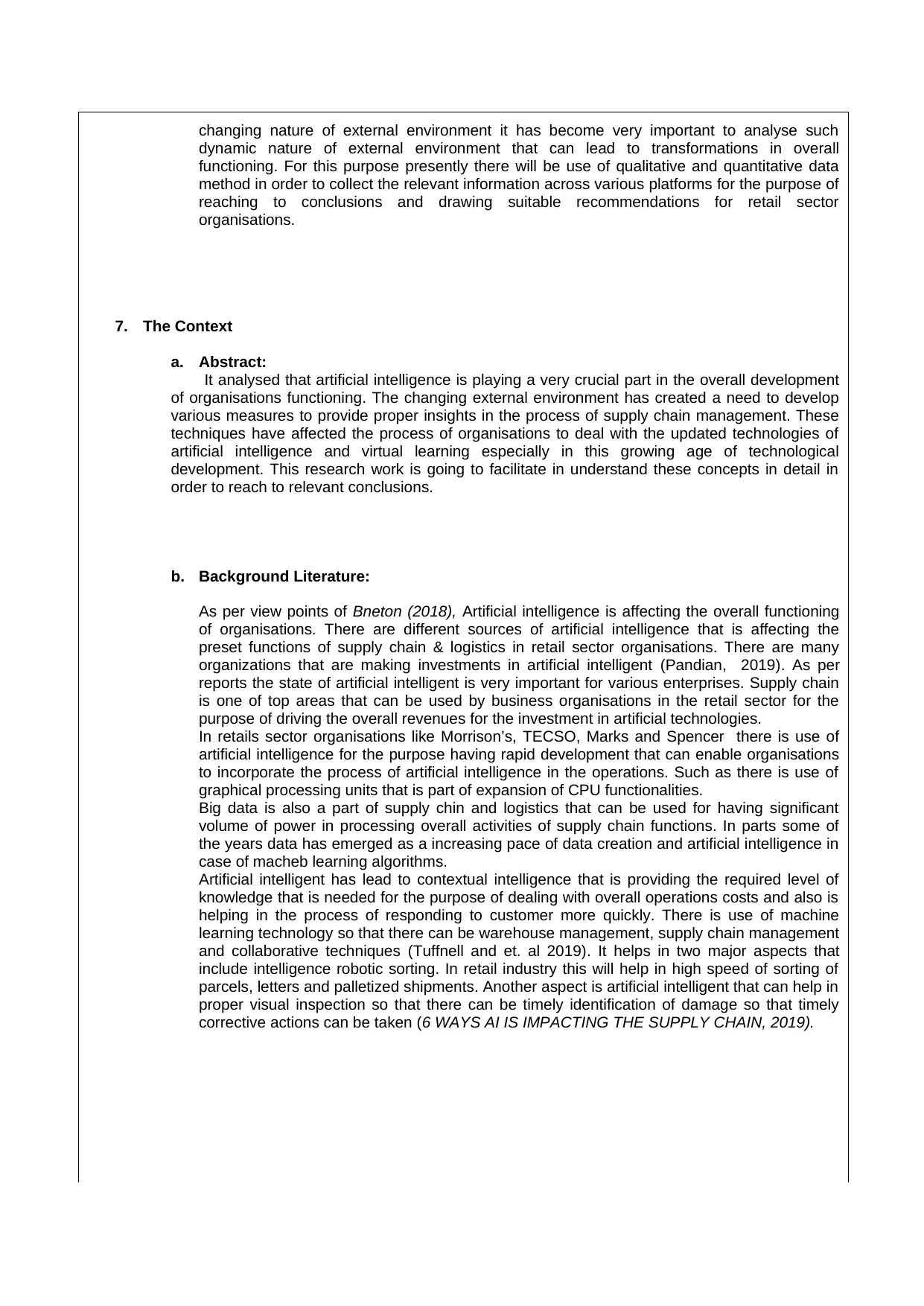
changing nature of external environment it has become very important to analyse such
dynamic nature of external environment that can lead to transformations in overall
functioning. For this purpose presently there will be use of qualitative and quantitative data
method in order to collect the relevant information across various platforms for the purpose of
reaching to conclusions and drawing suitable recommendations for retail sector
organisations.
7. The Context
a. Abstract:
It analysed that artificial intelligence is playing a very crucial part in the overall development
of organisations functioning. The changing external environment has created a need to develop
various measures to provide proper insights in the process of supply chain management. These
techniques have affected the process of organisations to deal with the updated technologies of
artificial intelligence and virtual learning especially in this growing age of technological
development. This research work is going to facilitate in understand these concepts in detail in
order to reach to relevant conclusions.
b. Background Literature:
As per view points of Bneton (2018), Artificial intelligence is affecting the overall functioning
of organisations. There are different sources of artificial intelligence that is affecting the
preset functions of supply chain & logistics in retail sector organisations. There are many
organizations that are making investments in artificial intelligent (Pandian, 2019). As per
reports the state of artificial intelligent is very important for various enterprises. Supply chain
is one of top areas that can be used by business organisations in the retail sector for the
purpose of driving the overall revenues for the investment in artificial technologies.
In retails sector organisations like Morrison’s, TECSO, Marks and Spencer there is use of
artificial intelligence for the purpose having rapid development that can enable organisations
to incorporate the process of artificial intelligence in the operations. Such as there is use of
graphical processing units that is part of expansion of CPU functionalities.
Big data is also a part of supply chin and logistics that can be used for having significant
volume of power in processing overall activities of supply chain functions. In parts some of
the years data has emerged as a increasing pace of data creation and artificial intelligence in
case of macheb learning algorithms.
Artificial intelligent has lead to contextual intelligence that is providing the required level of
knowledge that is needed for the purpose of dealing with overall operations costs and also is
helping in the process of responding to customer more quickly. There is use of machine
learning technology so that there can be warehouse management, supply chain management
and collaborative techniques (Tuffnell and et. al 2019). It helps in two major aspects that
include intelligence robotic sorting. In retail industry this will help in high speed of sorting of
parcels, letters and palletized shipments. Another aspect is artificial intelligent that can help in
proper visual inspection so that there can be timely identification of damage so that timely
corrective actions can be taken (6 WAYS AI IS IMPACTING THE SUPPLY CHAIN, 2019).
dynamic nature of external environment that can lead to transformations in overall
functioning. For this purpose presently there will be use of qualitative and quantitative data
method in order to collect the relevant information across various platforms for the purpose of
reaching to conclusions and drawing suitable recommendations for retail sector
organisations.
7. The Context
a. Abstract:
It analysed that artificial intelligence is playing a very crucial part in the overall development
of organisations functioning. The changing external environment has created a need to develop
various measures to provide proper insights in the process of supply chain management. These
techniques have affected the process of organisations to deal with the updated technologies of
artificial intelligence and virtual learning especially in this growing age of technological
development. This research work is going to facilitate in understand these concepts in detail in
order to reach to relevant conclusions.
b. Background Literature:
As per view points of Bneton (2018), Artificial intelligence is affecting the overall functioning
of organisations. There are different sources of artificial intelligence that is affecting the
preset functions of supply chain & logistics in retail sector organisations. There are many
organizations that are making investments in artificial intelligent (Pandian, 2019). As per
reports the state of artificial intelligent is very important for various enterprises. Supply chain
is one of top areas that can be used by business organisations in the retail sector for the
purpose of driving the overall revenues for the investment in artificial technologies.
In retails sector organisations like Morrison’s, TECSO, Marks and Spencer there is use of
artificial intelligence for the purpose having rapid development that can enable organisations
to incorporate the process of artificial intelligence in the operations. Such as there is use of
graphical processing units that is part of expansion of CPU functionalities.
Big data is also a part of supply chin and logistics that can be used for having significant
volume of power in processing overall activities of supply chain functions. In parts some of
the years data has emerged as a increasing pace of data creation and artificial intelligence in
case of macheb learning algorithms.
Artificial intelligent has lead to contextual intelligence that is providing the required level of
knowledge that is needed for the purpose of dealing with overall operations costs and also is
helping in the process of responding to customer more quickly. There is use of machine
learning technology so that there can be warehouse management, supply chain management
and collaborative techniques (Tuffnell and et. al 2019). It helps in two major aspects that
include intelligence robotic sorting. In retail industry this will help in high speed of sorting of
parcels, letters and palletized shipments. Another aspect is artificial intelligent that can help in
proper visual inspection so that there can be timely identification of damage so that timely
corrective actions can be taken (6 WAYS AI IS IMPACTING THE SUPPLY CHAIN, 2019).
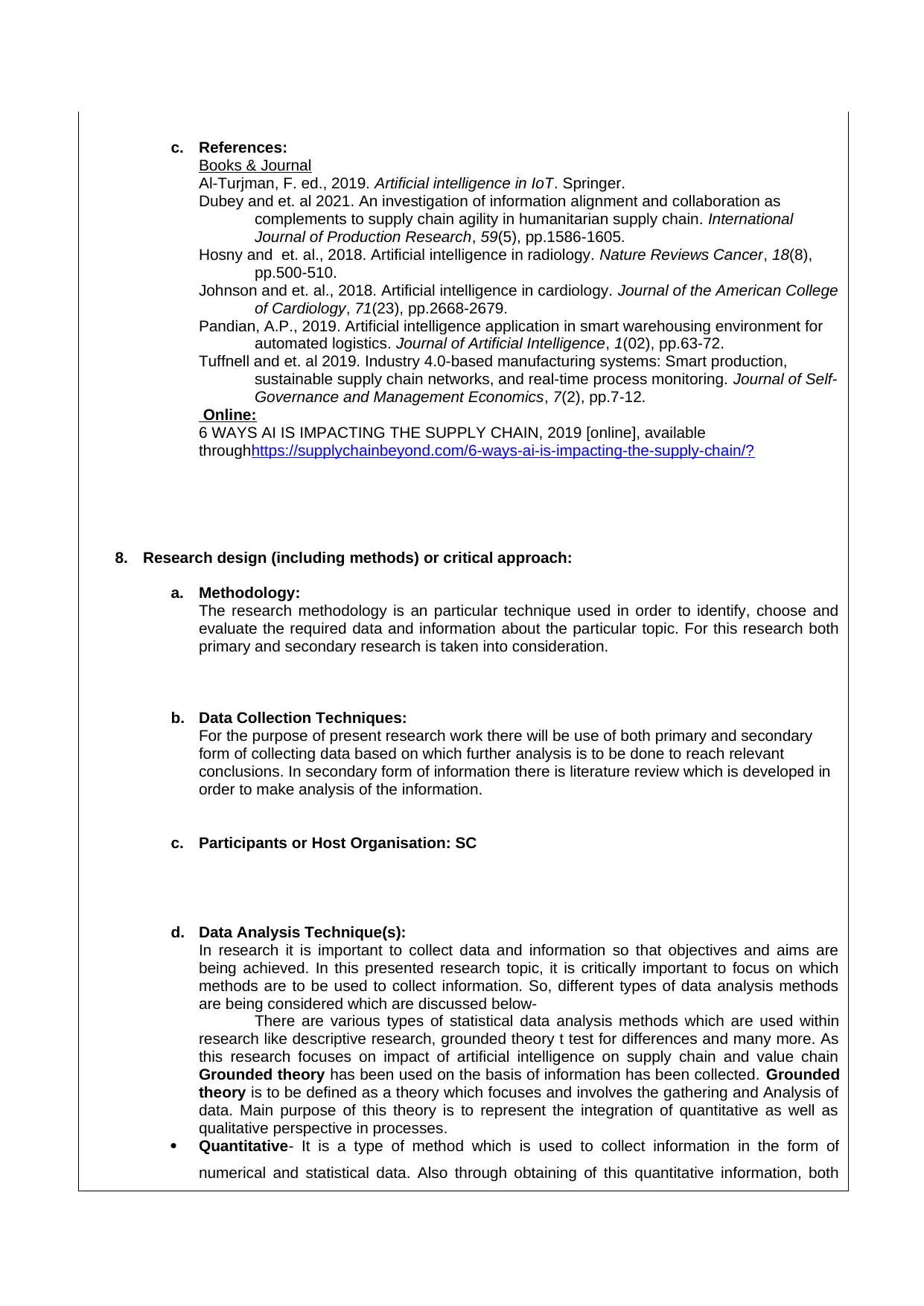
c. References:
Books & Journal
Al-Turjman, F. ed., 2019. Artificial intelligence in IoT. Springer.
Dubey and et. al 2021. An investigation of information alignment and collaboration as
complements to supply chain agility in humanitarian supply chain. International
Journal of Production Research, 59(5), pp.1586-1605.
Hosny and et. al., 2018. Artificial intelligence in radiology. Nature Reviews Cancer, 18(8),
pp.500-510.
Johnson and et. al., 2018. Artificial intelligence in cardiology. Journal of the American College
of Cardiology, 71(23), pp.2668-2679.
Pandian, A.P., 2019. Artificial intelligence application in smart warehousing environment for
automated logistics. Journal of Artificial Intelligence, 1(02), pp.63-72.
Tuffnell and et. al 2019. Industry 4.0-based manufacturing systems: Smart production,
sustainable supply chain networks, and real-time process monitoring. Journal of Self-
Governance and Management Economics, 7(2), pp.7-12.
Online:
6 WAYS AI IS IMPACTING THE SUPPLY CHAIN, 2019 [online], available
throughhttps://supplychainbeyond.com/6-ways-ai-is-impacting-the-supply-chain/?
8. Research design (including methods) or critical approach:
a. Methodology:
The research methodology is an particular technique used in order to identify, choose and
evaluate the required data and information about the particular topic. For this research both
primary and secondary research is taken into consideration.
b. Data Collection Techniques:
For the purpose of present research work there will be use of both primary and secondary
form of collecting data based on which further analysis is to be done to reach relevant
conclusions. In secondary form of information there is literature review which is developed in
order to make analysis of the information.
c. Participants or Host Organisation: SC
d. Data Analysis Technique(s):
In research it is important to collect data and information so that objectives and aims are
being achieved. In this presented research topic, it is critically important to focus on which
methods are to be used to collect information. So, different types of data analysis methods
are being considered which are discussed below-
There are various types of statistical data analysis methods which are used within
research like descriptive research, grounded theory t test for differences and many more. As
this research focuses on impact of artificial intelligence on supply chain and value chain
Grounded theory has been used on the basis of information has been collected. Grounded
theory is to be defined as a theory which focuses and involves the gathering and Analysis of
data. Main purpose of this theory is to represent the integration of quantitative as well as
qualitative perspective in processes.
Quantitative- It is a type of method which is used to collect information in the form of
numerical and statistical data. Also through obtaining of this quantitative information, both
Books & Journal
Al-Turjman, F. ed., 2019. Artificial intelligence in IoT. Springer.
Dubey and et. al 2021. An investigation of information alignment and collaboration as
complements to supply chain agility in humanitarian supply chain. International
Journal of Production Research, 59(5), pp.1586-1605.
Hosny and et. al., 2018. Artificial intelligence in radiology. Nature Reviews Cancer, 18(8),
pp.500-510.
Johnson and et. al., 2018. Artificial intelligence in cardiology. Journal of the American College
of Cardiology, 71(23), pp.2668-2679.
Pandian, A.P., 2019. Artificial intelligence application in smart warehousing environment for
automated logistics. Journal of Artificial Intelligence, 1(02), pp.63-72.
Tuffnell and et. al 2019. Industry 4.0-based manufacturing systems: Smart production,
sustainable supply chain networks, and real-time process monitoring. Journal of Self-
Governance and Management Economics, 7(2), pp.7-12.
Online:
6 WAYS AI IS IMPACTING THE SUPPLY CHAIN, 2019 [online], available
throughhttps://supplychainbeyond.com/6-ways-ai-is-impacting-the-supply-chain/?
8. Research design (including methods) or critical approach:
a. Methodology:
The research methodology is an particular technique used in order to identify, choose and
evaluate the required data and information about the particular topic. For this research both
primary and secondary research is taken into consideration.
b. Data Collection Techniques:
For the purpose of present research work there will be use of both primary and secondary
form of collecting data based on which further analysis is to be done to reach relevant
conclusions. In secondary form of information there is literature review which is developed in
order to make analysis of the information.
c. Participants or Host Organisation: SC
d. Data Analysis Technique(s):
In research it is important to collect data and information so that objectives and aims are
being achieved. In this presented research topic, it is critically important to focus on which
methods are to be used to collect information. So, different types of data analysis methods
are being considered which are discussed below-
There are various types of statistical data analysis methods which are used within
research like descriptive research, grounded theory t test for differences and many more. As
this research focuses on impact of artificial intelligence on supply chain and value chain
Grounded theory has been used on the basis of information has been collected. Grounded
theory is to be defined as a theory which focuses and involves the gathering and Analysis of
data. Main purpose of this theory is to represent the integration of quantitative as well as
qualitative perspective in processes.
Quantitative- It is a type of method which is used to collect information in the form of
numerical and statistical data. Also through obtaining of this quantitative information, both
⊘ This is a preview!⊘
Do you want full access?
Subscribe today to unlock all pages.

Trusted by 1+ million students worldwide
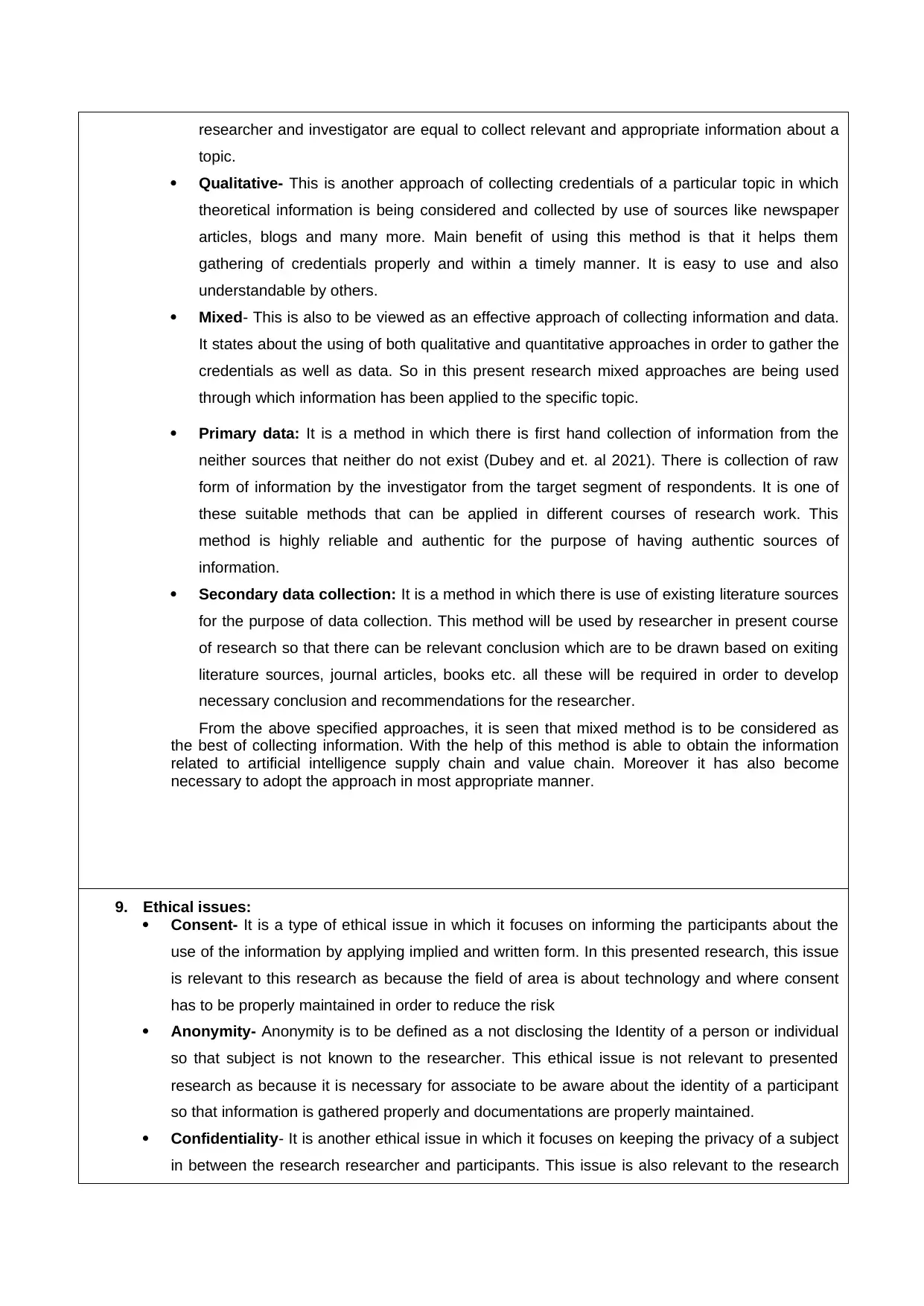
researcher and investigator are equal to collect relevant and appropriate information about a
topic.
Qualitative- This is another approach of collecting credentials of a particular topic in which
theoretical information is being considered and collected by use of sources like newspaper
articles, blogs and many more. Main benefit of using this method is that it helps them
gathering of credentials properly and within a timely manner. It is easy to use and also
understandable by others.
Mixed- This is also to be viewed as an effective approach of collecting information and data.
It states about the using of both qualitative and quantitative approaches in order to gather the
credentials as well as data. So in this present research mixed approaches are being used
through which information has been applied to the specific topic.
Primary data: It is a method in which there is first hand collection of information from the
neither sources that neither do not exist (Dubey and et. al 2021). There is collection of raw
form of information by the investigator from the target segment of respondents. It is one of
these suitable methods that can be applied in different courses of research work. This
method is highly reliable and authentic for the purpose of having authentic sources of
information.
Secondary data collection: It is a method in which there is use of existing literature sources
for the purpose of data collection. This method will be used by researcher in present course
of research so that there can be relevant conclusion which are to be drawn based on exiting
literature sources, journal articles, books etc. all these will be required in order to develop
necessary conclusion and recommendations for the researcher.
From the above specified approaches, it is seen that mixed method is to be considered as
the best of collecting information. With the help of this method is able to obtain the information
related to artificial intelligence supply chain and value chain. Moreover it has also become
necessary to adopt the approach in most appropriate manner.
9. Ethical issues:
Consent- It is a type of ethical issue in which it focuses on informing the participants about the
use of the information by applying implied and written form. In this presented research, this issue
is relevant to this research as because the field of area is about technology and where consent
has to be properly maintained in order to reduce the risk
Anonymity- Anonymity is to be defined as a not disclosing the Identity of a person or individual
so that subject is not known to the researcher. This ethical issue is not relevant to presented
research as because it is necessary for associate to be aware about the identity of a participant
so that information is gathered properly and documentations are properly maintained.
Confidentiality- It is another ethical issue in which it focuses on keeping the privacy of a subject
in between the research researcher and participants. This issue is also relevant to the research
topic.
Qualitative- This is another approach of collecting credentials of a particular topic in which
theoretical information is being considered and collected by use of sources like newspaper
articles, blogs and many more. Main benefit of using this method is that it helps them
gathering of credentials properly and within a timely manner. It is easy to use and also
understandable by others.
Mixed- This is also to be viewed as an effective approach of collecting information and data.
It states about the using of both qualitative and quantitative approaches in order to gather the
credentials as well as data. So in this present research mixed approaches are being used
through which information has been applied to the specific topic.
Primary data: It is a method in which there is first hand collection of information from the
neither sources that neither do not exist (Dubey and et. al 2021). There is collection of raw
form of information by the investigator from the target segment of respondents. It is one of
these suitable methods that can be applied in different courses of research work. This
method is highly reliable and authentic for the purpose of having authentic sources of
information.
Secondary data collection: It is a method in which there is use of existing literature sources
for the purpose of data collection. This method will be used by researcher in present course
of research so that there can be relevant conclusion which are to be drawn based on exiting
literature sources, journal articles, books etc. all these will be required in order to develop
necessary conclusion and recommendations for the researcher.
From the above specified approaches, it is seen that mixed method is to be considered as
the best of collecting information. With the help of this method is able to obtain the information
related to artificial intelligence supply chain and value chain. Moreover it has also become
necessary to adopt the approach in most appropriate manner.
9. Ethical issues:
Consent- It is a type of ethical issue in which it focuses on informing the participants about the
use of the information by applying implied and written form. In this presented research, this issue
is relevant to this research as because the field of area is about technology and where consent
has to be properly maintained in order to reduce the risk
Anonymity- Anonymity is to be defined as a not disclosing the Identity of a person or individual
so that subject is not known to the researcher. This ethical issue is not relevant to presented
research as because it is necessary for associate to be aware about the identity of a participant
so that information is gathered properly and documentations are properly maintained.
Confidentiality- It is another ethical issue in which it focuses on keeping the privacy of a subject
in between the research researcher and participants. This issue is also relevant to the research
Paraphrase This Document
Need a fresh take? Get an instant paraphrase of this document with our AI Paraphraser
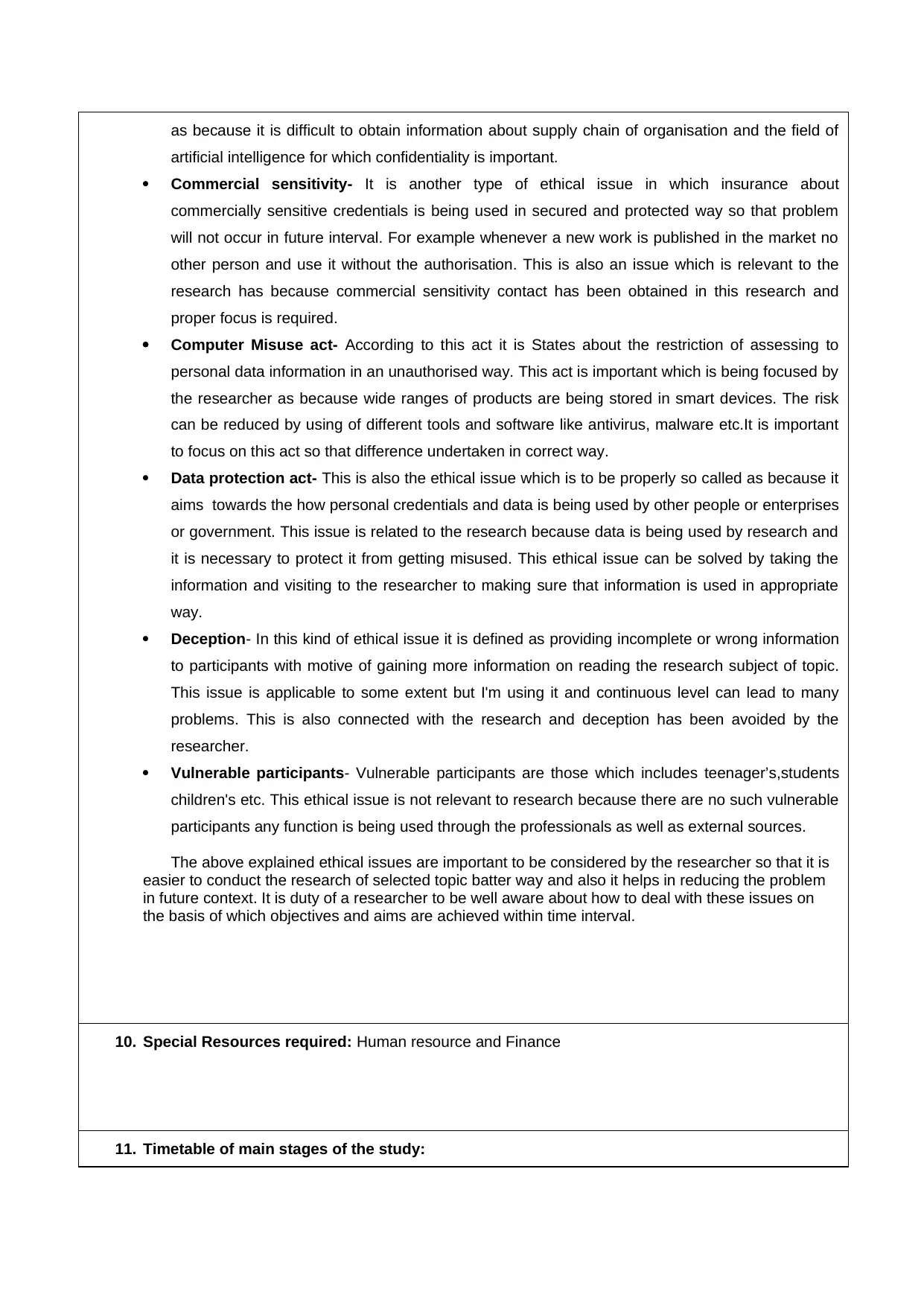
as because it is difficult to obtain information about supply chain of organisation and the field of
artificial intelligence for which confidentiality is important.
Commercial sensitivity- It is another type of ethical issue in which insurance about
commercially sensitive credentials is being used in secured and protected way so that problem
will not occur in future interval. For example whenever a new work is published in the market no
other person and use it without the authorisation. This is also an issue which is relevant to the
research has because commercial sensitivity contact has been obtained in this research and
proper focus is required.
Computer Misuse act- According to this act it is States about the restriction of assessing to
personal data information in an unauthorised way. This act is important which is being focused by
the researcher as because wide ranges of products are being stored in smart devices. The risk
can be reduced by using of different tools and software like antivirus, malware etc.It is important
to focus on this act so that difference undertaken in correct way.
Data protection act- This is also the ethical issue which is to be properly so called as because it
aims towards the how personal credentials and data is being used by other people or enterprises
or government. This issue is related to the research because data is being used by research and
it is necessary to protect it from getting misused. This ethical issue can be solved by taking the
information and visiting to the researcher to making sure that information is used in appropriate
way.
Deception- In this kind of ethical issue it is defined as providing incomplete or wrong information
to participants with motive of gaining more information on reading the research subject of topic.
This issue is applicable to some extent but I'm using it and continuous level can lead to many
problems. This is also connected with the research and deception has been avoided by the
researcher.
Vulnerable participants- Vulnerable participants are those which includes teenager’s,students
children's etc. This ethical issue is not relevant to research because there are no such vulnerable
participants any function is being used through the professionals as well as external sources.
The above explained ethical issues are important to be considered by the researcher so that it is
easier to conduct the research of selected topic batter way and also it helps in reducing the problem
in future context. It is duty of a researcher to be well aware about how to deal with these issues on
the basis of which objectives and aims are achieved within time interval.
10. Special Resources required: Human resource and Finance
11. Timetable of main stages of the study:
artificial intelligence for which confidentiality is important.
Commercial sensitivity- It is another type of ethical issue in which insurance about
commercially sensitive credentials is being used in secured and protected way so that problem
will not occur in future interval. For example whenever a new work is published in the market no
other person and use it without the authorisation. This is also an issue which is relevant to the
research has because commercial sensitivity contact has been obtained in this research and
proper focus is required.
Computer Misuse act- According to this act it is States about the restriction of assessing to
personal data information in an unauthorised way. This act is important which is being focused by
the researcher as because wide ranges of products are being stored in smart devices. The risk
can be reduced by using of different tools and software like antivirus, malware etc.It is important
to focus on this act so that difference undertaken in correct way.
Data protection act- This is also the ethical issue which is to be properly so called as because it
aims towards the how personal credentials and data is being used by other people or enterprises
or government. This issue is related to the research because data is being used by research and
it is necessary to protect it from getting misused. This ethical issue can be solved by taking the
information and visiting to the researcher to making sure that information is used in appropriate
way.
Deception- In this kind of ethical issue it is defined as providing incomplete or wrong information
to participants with motive of gaining more information on reading the research subject of topic.
This issue is applicable to some extent but I'm using it and continuous level can lead to many
problems. This is also connected with the research and deception has been avoided by the
researcher.
Vulnerable participants- Vulnerable participants are those which includes teenager’s,students
children's etc. This ethical issue is not relevant to research because there are no such vulnerable
participants any function is being used through the professionals as well as external sources.
The above explained ethical issues are important to be considered by the researcher so that it is
easier to conduct the research of selected topic batter way and also it helps in reducing the problem
in future context. It is duty of a researcher to be well aware about how to deal with these issues on
the basis of which objectives and aims are achieved within time interval.
10. Special Resources required: Human resource and Finance
11. Timetable of main stages of the study:
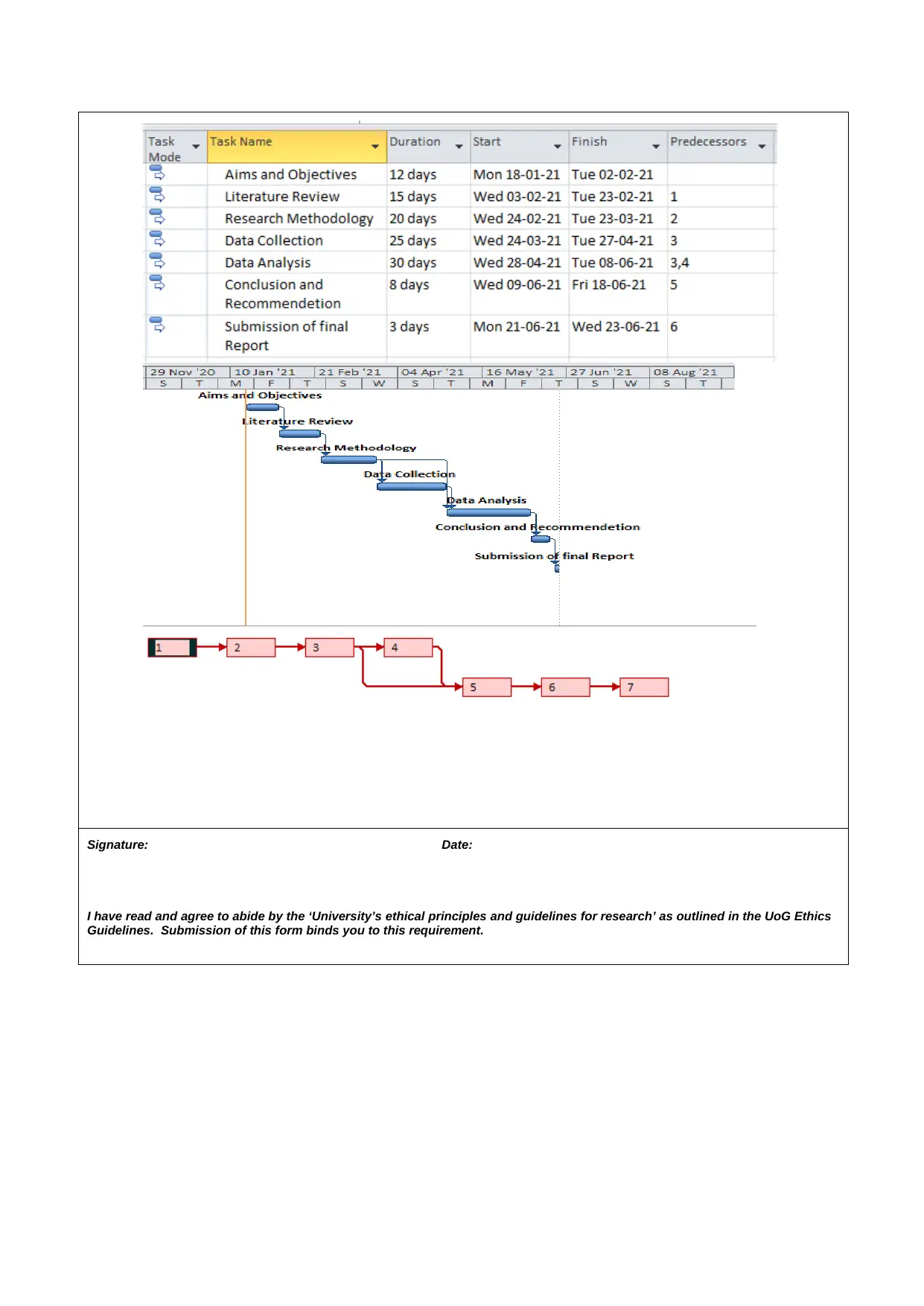
Signature: Date:
I have read and agree to abide by the ‘University’s ethical principles and guidelines for research’ as outlined in the UoG Ethics
Guidelines. Submission of this form binds you to this requirement.
I have read and agree to abide by the ‘University’s ethical principles and guidelines for research’ as outlined in the UoG Ethics
Guidelines. Submission of this form binds you to this requirement.
⊘ This is a preview!⊘
Do you want full access?
Subscribe today to unlock all pages.

Trusted by 1+ million students worldwide
1 out of 6
Related Documents
Your All-in-One AI-Powered Toolkit for Academic Success.
+13062052269
info@desklib.com
Available 24*7 on WhatsApp / Email
![[object Object]](/_next/static/media/star-bottom.7253800d.svg)
Unlock your academic potential
Copyright © 2020–2026 A2Z Services. All Rights Reserved. Developed and managed by ZUCOL.




